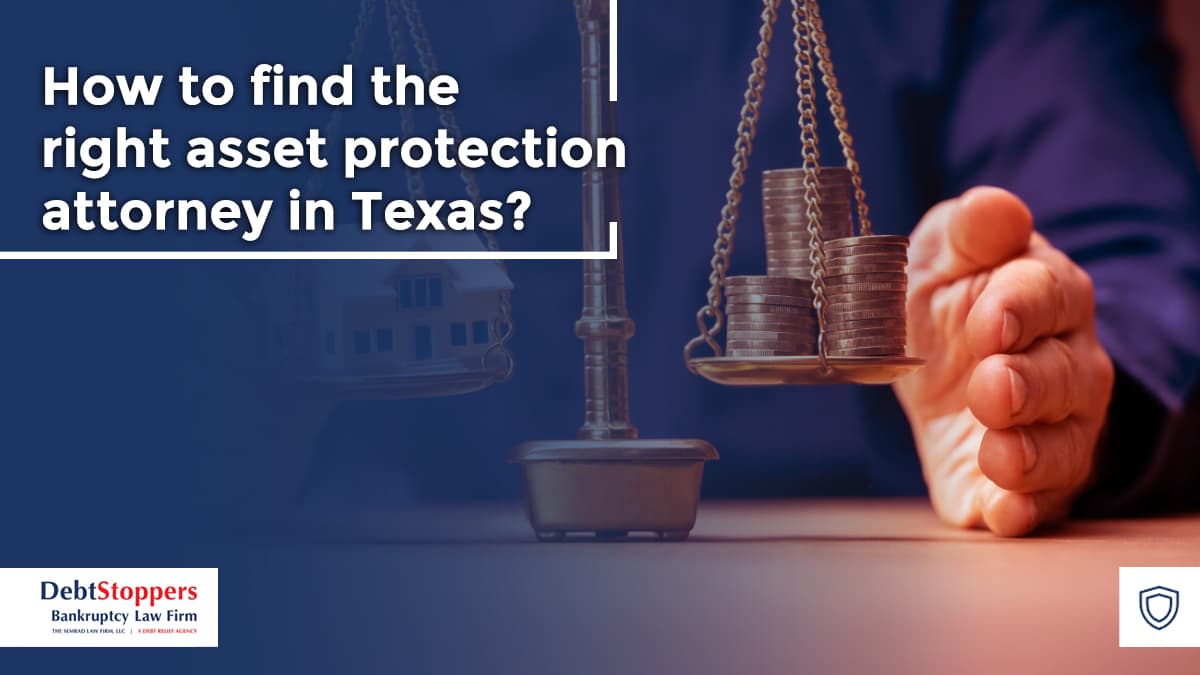How to find the right asset protection attorney in Texas?

Finding the right asset protection attorney in Texas requires careful consideration of several factors to ensure you select an attorney who can effectively handle your case.
How does asset protection in Texas work?
Asset protection in Texas is dictated by a combination of state laws that provide certain protections to individuals from creditors. Texas is known for having some of the most debtor-friendly asset protection laws in the United States.
For example, Texas offers one of the most generous homestead exemptions in the country. Your primary residence is generally protected from most creditors, regardless of its value. This means creditors cannot force you to sell your home to satisfy a debt, except in cases like unpaid property taxes, mortgage payments, or specific liens.
Texas law exempts also certain types of personal property from creditors including:
- Up to $50,000 in personal property for a single adult, or $100,000 for a family.
- Household furnishings, food, and clothing.
- Tools, equipment, or books used in your trade or profession.
- Certain retirement accounts, including IRAs and 401(k)s.
- Life insurance and annuity contracts.
- Two firearms.
Most retirement accounts, including IRAs, 401(k)s, and pensions, are fully protected under Texas law. This means they are generally exempt from creditor claims. Additionally, in Texas,
wages for personal services are generally protected from garnishment by creditors. However, this does not apply to obligations like child support or unpaid taxes.
The cash value and benefits of life insurance policies and annuities are protected from creditors in Texas, making them a valuable asset protection tool. Additionally, forming a business entity, such as a Limited Liability Company (LLC) or a Family Limited Partnership (FLP), can provide asset protection by separating personal assets from business liabilities.
While Texas laws are protective, they do not shield assets that are transferred to avoid paying creditors. Such transfers can be challenged in court under fraudulent transfer laws. Texas also allows couples to enter into pre-marital (prenuptial) and post-marital agreements to protect individual assets in case of divorce or creditor claims against one spouse.
Setting up an irrevocable trust can also protect assets from creditors, as the trust’s assets are no longer considered your personal property. Texas also recognizes domestic asset protection trusts, which offer another layer of protection.
Texas residents can choose between state or federal exemptions when filing for bankruptcy, but the state exemptions are often more favorable due to the generous homestead and personal property protections. Texas’s asset protection laws are robust, but they require careful planning and legal guidance to maximize their effectiveness.

What are the different types of asset protection in Texas?
Asset protection in Texas involves several strategies and legal structures designed to shield assets from creditors. Some different types of asset protection available in Texas include exceptions for a homestead, personal property, retirement accounts, wages, life insurance and annuities, business entities, family limited partnerships, trusts, pre-marital and post-marital agreements, tenancy by the entirety, 529 college savings plants, health savings accounts, insurance policies, and bankruptcy.
Asset protection strategies should be implemented well in advance of any potential claims or creditor actions to avoid accusations of fraudulent conveyance. It is crucial to consult with an attorney who specializes in asset protection to ensure that your strategy is effective and compliant with Texas law.
Each of these asset protection tools can be powerful on its own, but they are often most effective when used in combination as part of a comprehensive asset protection plan.
How to find the best Texas asset protection attorney?
Finding the best Texas asset protection attorney involves careful research and consideration of several factors. Here’s a step-by-step guide to help you find the right attorney for your needs:
Consider their experience
It’s important to consider an attorney’s experience and expertise in asset protection. Look for attorneys who specialize in asset protection, estate planning, or related areas like bankruptcy or business law. This specialization ensures they have the knowledge and experience to handle your specific needs. You should also check the attorney’s credentials, including their education, certifications, and professional affiliations. Attorneys who are board-certified in estate planning, tax law, or other relevant fields are often well-qualified.
Research references
When looking for the right asset protection attorney in Texas, it’s wise to read reviews and testimonials. You can look for reviews on websites like Avvo, Martindale-Hubbell, Google, or Yelp. Pay attention to feedback from clients who have similar asset protection needs. Many attorneys provide testimonials on their websites. These can give you insight into the attorney’s approach, communication style, and effectiveness.
Assess their communication skills
Many law firms will offer a free consultation, you should take this as an opportunity to assess their communication skills. The attorney should be able to explain complex legal concepts in a way that you understand. They should be transparent about the strategies they recommend and the potential risks involved. It’s important that you feel comfortable communicating with your attorney. During the consolation, you can evaluate if your communication style and expectations match.
Taking the time to carefully select an asset protection attorney can make a significant difference in the effectiveness of your asset protection strategy and your overall peace of mind.

What makes Debtstoppers the best asset protection attorneys in Texas?
Debtstoppers is one of the leading asset protection law firms in Texas. First, Debtstoppers specializes in asset protection. Debtstoppers has a deep understanding of bankruptcy law, particularly in Chapter 7 and Chapter 13 filings, which is critical for protecting assets. Their specialization in debt relief and bankruptcy gives them unique insights into how to safeguard assets from creditors.
The experienced attorneys at Debtstoppers will help tailor an asset protection strategy that will fit your unique needs, whether it involves protecting a family home, retirement accounts, or other personal assets.
Debtstoppers offers a full suite of legal services beyond just asset protection, including bankruptcy, foreclosure defense, and credit repair. This allows clients to address multiple financial issues with one trusted legal partner. Their approach combines legal expertise with financial planning, ensuring that clients receive holistic advice that covers both legal and financial aspects of asset protection.
Furthermore, Debtstoppers has a long history of successfully helping clients protect their assets. Their track record includes numerous cases where they have effectively shielded homes, retirement accounts, and other personal assets from creditors. Debtstoppers has garnered positive reviews and testimonials from clients who have benefited from their asset protection strategies, reflecting their reliability and effectiveness.
Simply put, Debtstoppers has a client-centric approach. Debtstoppers is known for providing personalized attention to each client, ensuring that they understand the complexities of asset protection and feel confident in their legal strategy. Debtstoppers’ legal team consists of highly skilled attorneys with extensive experience in asset protection and bankruptcy law. Their
Understanding the financial pressures their clients may face, Debtstoppers offers flexible payment options and affordable rates, making high-quality legal services accessible to more people. Debstoppers also offers free initial consultations, allowing potential clients to discuss their situation and explore their options without financial commitment.
Debtstoppers has an in-depth understanding of the state’s specific laws and exemptions, particularly the generous homestead and personal property exemptions that are crucial for asset protection.





